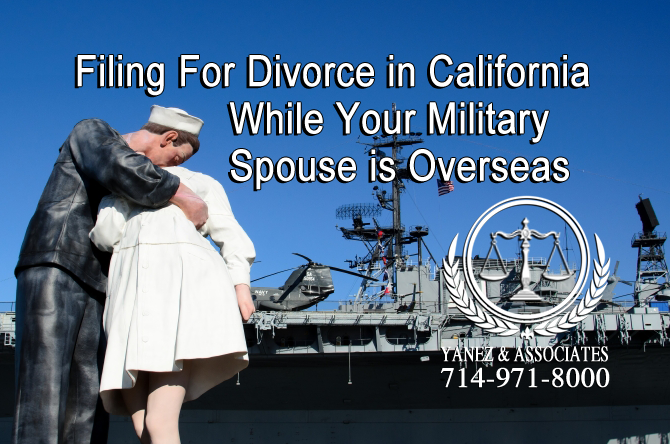The other party is in the military and I cannot find them, what can I do to move the case along in Orange County California if I cannot locate them?
A Guide to a California Divorce for Members of the Military
When divorcing an active member of the military, you and your spouse may already face obstacles that civilians may not face during a divorce. If your spouse is overseas, you may wonder if you can even file for divorce in California. How will child support or custody and visitation work with a military member who is currently abroad? What about the financial benefits of marriage to a member of the military?
Especially when it comes to unique circumstances surrounding a military divorce, you will want to discuss your case with a skilled divorce attorney. Remember that divorce will not only change your personal and financial lives, it will also affect your children, and should not be taken lightly.
A Military Divorce is Not Completely Different from a Civilian Divorce...

A Military Divorce is Not Completely Different from a Civilian Divorce, so how do they differ?
While there are certainly unique circumstances surrounding a military divorce, whether one or both spouses are members of the military, we will start by pointing out the similarities between the two.
A divorce, or a dissolution of marriage, no matter who the parties may be, will end the marriage. This means that following the divorce, both parties will be single and free to remarry.
The procedure for divorce is more or less the same; one party will file, the other party will respond, decisions and agreements will need to be made, and the two parties will go their separate ways. A military divorce still requires the two parties to divide their property and debts according to the law where they file, arrange a spousal support schedule, and agree to a child custody and visitation agreement that works best for the children. Members of the military are still financially responsible for their children.
However, a Military Divorce will Bring up Unique Issues
In a military divorce, you need to make sure that the court where you file for divorce has jurisdiction over your marriage. If your spouse is currently overseas, but is planning to return to California, and you meet the residency requirements for divorcing in California, you will likely file in California.
However, many factors, including where your spouse is, whether or not you can contact him or her, and whether he or she plans to move back to California following service in the military can affect your child custody agreement, where you file, how you create a divorce agreement, and how long it takes to get through your divorce.
Active military personnel have certain rights relating to some of these areas that civilians do not have.
Filing For Divorce in California While Your Military Spouse is Overseas

In California, if your spouse is in the military, you need to make sure that you file in a place that has jurisdiction over your marriage. To file in California, you need to meet the residency requirements for divorcing in California.
California Divorce Residency Requirements
In California, one spouse must have lived in California for at least the past six months, and in the county where the divorce will be filed for at least the past three months.
The spouse who is in the military does not need to be in the state at the time the divorce petition is filed, but the law requires that that he or she is notified of the proceedings no matter where in the world he or she may be stationed.
Serving a Military Spouse with Divorce Papers from California

When serving a Military Spouse with Divorce Papers from California - In order to get a divorce in California, you are legally required to serve your spouse with divorce papers. He or she has a right to be made aware of the divorce proceedings.
If your spouse is in the United States and does not live in a military base, there is little difference between serving your spouse and serving a civilian spouse.
However, divorcing an active duty member of the military can change the process of service.
The Servicemembers Civil Relief Act
This Act can affect how active duty service members are served with and required to handle divorce proceedings. While they are not allowed to simply neglect their divorce papers, whether they want the divorce or not, they may not be held completely responsible for failing to respond in a timely manner.
If your spouse resides on a military base, he or she should be served in person by either a process server or a sheriff. If you have trouble serving the papers, or if your spouse refuses them, you can contact the military base and let them know so that they can help or make sure that your spouse is available to receive the divorce petition.
If your spouse is stationed overseas on a military base, you may be able to send your divorce petition through certified mail with a return receipt. The package should be sent to either their Army Post Office or Fleet Post Office address, and you will need to make sure that you follow all rules for sending mail with a return receipt for both the United States Postal Service and the requirements from the country in which your spouse currently resides.
In some countries, you may not be able to serve your spouse through certified mail because either the military base or the foreign mail service does not support return service or allow service.
You may contact either an active duty, reserve, or civilian person to act as an officer of the court and serve your spouse with divorce papers overseas, but again, if your spouse is on a military base or on a ship, this may not be permitted.
In some situations, service may also violate the Hague Convention. In this case, you may need to send your petition to the central authority in the country where your spouse resides, and the central authority can then work to serve it to your spouse.
Federal laws in the United States have recently been modified to simplify the process of serving divorce papers on military couples when the couple has children and the military spouse is overseas. It is necessary to contact federal agencies and uniformed service members to help with the service of divorce papers, but it can be done.
In addition to affecting the simplicity of obtaining a divorce, the Servicemembers Civil Relief Act allows military personnel to delay certain legal proceedings, including a divorce, in ways that a civilian cannot. This means that your divorce may take longer to finalize, even if you do everything right.
The Divorce Agreement
Divorce agreements are necessary for all divorces, and they require a couple to agree on how to divide their property, debts and other assets, a spousal support plan, a child custody and visitation plan, and on child custody. When it comes to military divorce agreements, they can be difficult and time consuming to create, and some special circumstances can arise regarding children, retirement and pension plans, and spousal support.
Dividing Military Retirement and Pension in a California Divorce: The Uniformed Services Former Spouses’ Protection Act (USFSPA)
One of the most valuable assets that a military member has is his or her retirement and pension plan. The USFSPA allows each state to decide how to divide this in a divorce. If you are eligible to file in California and successfully serve your spouse with divorce papers, the California court has jurisdiction over your divorce, and can legally divide your property and debts, including a military retirement and pension plan.
Under USFSPA, the Defense Finance and Accounting Service (DFAS) will only pay the former spouse’s share of the retirement if there was an overlap of 10 years for the marriage and the military service. However, if the marriage and the spouse’s military service overlap for less than 10 years, the military spouse is responsible for ensuring that appropriate payments are made to the former spouse (you).
The way that the retirement and pension plan are divided will depend on your situation, your lawyer, and the specifics of your divorce.
What if My Spouse is Overseas but Agrees to a Divorce?

If your spouse also wants a divorce, the process can be much simpler - except for the process of serving the divorce petition.
You will need to find a way to create a divorce agreement, which may be easier to do with the help of a skilled military divorce lawyer.
A member of the military who is deployed or overseas can also qualify for a summary dissolution, and if your marriage qualifies, you may be able to have little contact and still successfully complete your divorce.
OC California Military Divorce Attorney
If you have any questions about filing for divorce while either you or your spouse are in the military, or if both of you are in the military, it is important that you contact a divorce attorney with experience in military divorces. Military status can affect many parts of your divorce, including initiating the divorce process, your child custody and visitation agreement, and the division of property.
Contact the attorneys at Yanez & Associates in Orange County today to schedule your free initial consultation.












